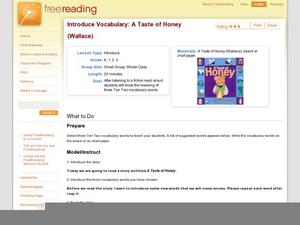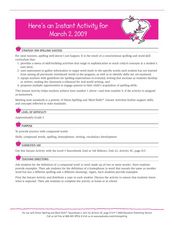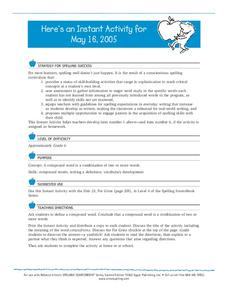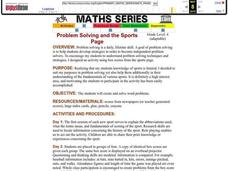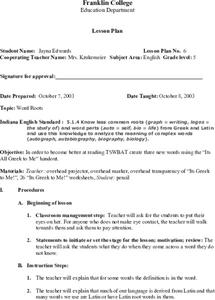Curated OER
Introduce Vocabulary: A Taste of Honey (Wallace)
A Taste of Honey offers learners a chance to practice with unknown words and context clues. Choose several vocabulary words to focus on as you read the picture book, or use the ones provided here. Pre-teach the words and have scholars...
Curated OER
Take the Prefix Challenge
Students form words using prefixes. In this prefix lesson, students compete in a "prefix challenge" to see which team can combine a set of twelve prefixes with a set of twelve words fastest. Students enter their words in a word log and...
Curated OER
What is an Atlatl?
Let's go an an archaeological dig! Prepare your kids with a list of vocabulary terms relating to archaeology, including different types of items that one might find. They study pictures of each item and play a memory game based on the...
EngageNY
The Decimal Expansion of Some Irrational Numbers
Develop a definition of irrational numbers through an exploration of square roots. The 11th instructional activity in this series of 25 asks scholars to estimate the value of a square root. Learners observe as the estimation extends...
EngageNY
Writing the Argument Essay: Moving from Planner to Drafting
It's an easy transition. Scholars identify transition words in the Pygmalion model essay and record definitions in the Transitions anchor chart. They then begin to look at the tone of the model essay. Finally, individuals begin writing...
US Institute of Peace
What Does Peace Mean?
Let peace begin with your class! After brainstorming definitions and interpretations of the word peace, class members draw their version of peace and pass it to a neighbor, who adds to the drawing. Several rounds later, students get...
Curated OER
Reading Word Recognition, Fluency, and Vocabulary
Eleventh graders analyze words that derive meaning from Greek, Roman, and Norse myths. In this myth vocabulary lesson, 11th graders work in learning groups as visual learners, kinesthetic learners, and artistic learners to identify the...
Curated OER
Meaning of Many Common Prefixes and Suffixes
Third graders examine words. For this vocabulary lesson, 3rd graders decipher unfamiliar words by finding and defining the root word. Students explore the changes that prefixes and suffixes make to root words.
Curated OER
Up From The Roots
Students review prefixes and root words then complete a Root Words worksheet. An answer sheet is provided with the lesson plan.
Curated OER
Roots
Young scholars are introduced to Latin and Greek roots, prefixes, and suffixes. They are given a lesson on ten root words that students identify the correct meaning of the words. Young scholars design cards that are divided into four parts.
Curated OER
Dictionary Bluff
Students practice their dictionary skills by participating in a game of words with correct and incorrect definitions. They must work in pairs to determine the incorrect definitions and uses for a word.
Curated OER
Practice With Compound Words and Homophones
Third graders work with compound words. In this compound word lesson, 3rd graders define and give examples of compound words and homophones. They complete an Instant Activity worksheet.
Curated OER
Rhyming Words
In this rhyming words worksheet, 4th graders complete activities such as circling rhyming words, writing rhyming words, and more. Students complete 6 activities.
Curated OER
Compound Words
Sixth graders define a compound word. In this compound word lesson, 6th graders complete a worksheet filling in the compound words defined.
Curated OER
Etymology
Learners dissect and build words from parts like prefixes, base words, suffixes, and inflectional endings. Etymology skills help us find the meanings of words by identifying the different parts that constitute them. Class members use...
Curated OER
Making Sense of Homographs
What is a homograph? Develop your students' vocabulary with a word association tool. Language arts classes discover what a homograph is and how it can be used as a visual thesaurus. They discover the other uses for homographs such as...
Curated OER
Problem Solving and the Sports Page
The use of box scores from baseball games is the foundation of this math lesson. Organize your class into groups of four, and give identical box scores from a baseball game that was just played. Have them create word problems from the...
US Institute of Peace
Perspectives on Peace
Much like a garden, once the seeds of peace are planted, they need to be tended! How can humankind make and keep peace? The second installment in a series of 15 peacebuilding activities focuses on different perceptions of peace. The...
Curated OER
Phineas Gage: Notecard Vocabulary Strategy
Understanding the vocabulary in a text, especially a text like Phineas Gage: A Gruesome but True Story About Brain Science that includes quite a few technical terms, can be the key to understanding the text as a whole. Learners focus on...
Prestwick House
Vocabulary in Context: Wilderness Survival
Do you have what it takes to survive in the wilderness? A high-interest reading passage offers practical advice while incorporating vocabulary practice. Follow-up worksheets focus on skills such as defining words, making inferences, and...
EngageNY
Grade 11 ELA Module 2: Unit 1, Lesson 10
What are you implying? Scholars look at paragraphs eight and nine of the chapter "Of Our Spiritual Strivings" to determine the implications of Du Bois's use of metaphors. In groups, readers discuss the use of metaphors and add their...
Curated OER
Word Roots
Fifth graders discover that for some words, the definition is actually in the word and that much of our language is derived from Latin and many words have Latin roots. They look at the definition part of the worksheet and go over it...
Curated OER
New words in the dictionary
Students examine how language evolves. They discover that language reflects changes in society. Students guess the meaning of words. In a group activity, students become wordsmiths by inventing new words. Students devise alternative...
Curated OER
What Does Success Mean to Me?
One can't set goals until he knows what he needs to feel successful. Learners discuss what they believe it means to be successful. They then fill out a graphic organizer showing four different paths to a successful adult life.


